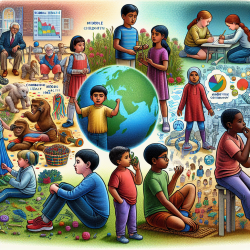Understanding the "Missing Middle" in Child Development
Middle childhood, defined as the ages between six and twelve, is a critical developmental stage that is often overlooked in global health information systems and policies. According to the research article "The Missing Middle of Childhood" by Voss et al., this stage serves as a bridge between early childhood and adolescence, involving rapid physical and psychological transitions. Despite its importance, middle childhood remains underrepresented in health policies and research, which hampers the development of targeted interventions.
The Importance of Middle Childhood
During middle childhood, children experience significant cognitive, emotional, and social growth. They refine their motor skills, learn about social relationships, and develop emotional regulation. This period is also crucial for the development of planning and self-direction skills. However, the lack of standardized indicators and age-appropriate data makes it difficult to address the specific needs of this age group.
Challenges Facing Middle Childhood
The research highlights several challenges faced by children in middle childhood:
- Mental Health: Anxiety disorders peak around age ten, and body dissatisfaction is prevalent among children aged 6 to 10. Despite these challenges, mental health services for children are severely lacking, especially in low- and middle-income countries.
- Obesity: The prevalence of overweight and obesity is rising globally, with significant variations between regions. This trend poses a major public health concern, as it increases the risk of non-communicable diseases later in life.
Opportunities for Practitioners
For practitioners, the findings of this research underscore the need for targeted interventions during middle childhood. Here are some actionable steps:
- Advocate for Data Collection: Encourage the collection of standardized data on middle childhood to better understand the specific needs of this age group.
- Implement School-Based Programs: Schools play a vital role in promoting mental and physical health. Programs like "Communities That Care" and "Helping Adolescents Thrive" can be adapted to address the needs of children in middle childhood.
- Focus on Mental Health: Given the high prevalence of mental health issues, practitioners should prioritize mental health assessments and interventions in their practice.
Conclusion
Middle childhood is a pivotal developmental stage that requires more attention from policymakers and practitioners alike. By focusing on this "missing middle," we can develop more effective strategies to ensure that all children have the opportunity to thrive. For those interested in diving deeper into the research, I highly recommend reading the original paper, The Missing Middle of Childhood.










